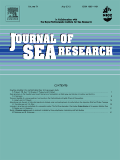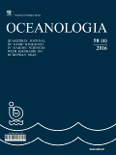
MARINE GEORESOURCES & GEOTECHNOLOGY
Scope & Guideline
Pioneering Solutions for Marine Challenges
Introduction
Aims and Scopes
- Marine Geotechnical Engineering:
Research articles explore the geotechnical behavior of marine soils, including their mechanical properties, consolidation behavior, and stability analyses under various loading conditions. - Marine Resource Exploration and Exploitation:
The journal emphasizes methodologies and technologies for the exploration and extraction of marine resources, including hydrocarbons, minerals, and renewable energy sources. - Environmental Impact Assessments:
Papers discuss the environmental impacts of marine construction and resource extraction, focusing on sustainable practices and mitigation strategies. - Innovative Testing and Modelling Techniques:
The journal features advancements in experimental and numerical modeling techniques to better understand and predict the behavior of marine soils and structures. - Marine Sediment Dynamics:
Research on sedimentation processes, liquefaction potential, and seabed stability is a core area, reflecting the importance of understanding sediment behavior in marine environments. - Interdisciplinary Approaches:
The journal promotes interdisciplinary research that combines geotechnical engineering, marine biology, environmental science, and geochemistry to address complex marine challenges.
Trending and Emerging
- Sustainable Marine Resource Management:
Research focusing on sustainable practices for marine resource management is gaining momentum, reflecting global concerns over environmental degradation and resource depletion. - Advancements in Machine Learning and AI Applications:
The integration of machine learning and artificial intelligence in predicting soil behavior, resource assessment, and environmental impact assessments is increasingly prevalent. - Bioengineering and Eco-friendly Solutions:
The exploration of bioengineering techniques, such as microbial-induced calcite precipitation (MICP), for soil stabilization and erosion control is emerging as a significant area of interest. - Climate Change Impact Studies on Marine Environments:
There is a growing trend in studying the effects of climate change on marine geotechnical properties, sediment dynamics, and coastal resilience, driven by increasing environmental awareness. - Deep-Sea Mining Technologies:
With the rise of interest in deep-sea mining, innovative technologies and methodologies for resource extraction in challenging marine environments are becoming a focal point.
Declining or Waning
- Traditional Offshore Construction Techniques:
Research on conventional methods for offshore construction appears to be declining as innovative and sustainable methodologies gain traction. - Basic Soil Mechanics:
There is a noticeable decrease in publications solely focused on fundamental soil mechanics, as the journal increasingly emphasizes applied research and innovative testing methods. - Dredging Techniques:
Although still relevant, traditional dredging techniques are being overshadowed by research focusing on sustainable and environmentally friendly alternatives. - Hydraulic Engineering:
The focus on hydraulic engineering principles in marine contexts has diminished, indicating a shift towards integrating broader environmental and geotechnical considerations.
Similar Journals

Indian Journal of Geo-Marine Sciences
Empowering Global Research in Marine SciencesThe Indian Journal of Geo-Marine Sciences, published by the NATIONAL INSTITUTE OF SCIENCE COMMUNICATION & INFORMATICS (NISCAIR), serves as a vital platform dedicated to the dissemination and advancement of knowledge in the field of marine and geosciences. As an open-access journal, it allows for improved visibility and accessibility of research findings to a global audience, enabling researchers, professionals, and students to share insights into oceanography and related disciplines. With a publication history spanning from 2007 to 2010 and continuing from 2012 to 2024, it has established itself within the academic community as a reliable source of innovative research, despite being classified in Q4 of Oceanography and holding a Scopus rank that places it in the 27th percentile. This journal is particularly relevant for those investigating marine ecosystems, geological oceanography, and their interconnections, thus playing an essential role in fostering understanding and communication within this important area of scientific inquiry.

Ocean Science
Connecting Scholars through Oceanic InsightsOcean Science, published by COPERNICUS GESELLSCHAFT MBH, stands as a premier Open Access journal in the fields of Oceanography and Paleontology, with a commendable impact factor that highlights its influence in the scientific community. Since its inception in 2005, Ocean Science has provided a vital platform for the dissemination of innovative research and discoveries, boasting prestigious rankings of Q1 in both Oceanography and Paleontology categories as of 2023, along with impressive Scopus rankings (7th in Paleontology and 28th in Oceanography). Based in Göttingen, Germany, the journal's commitment to open access ensures that groundbreaking research is readily available to a global audience, fostering knowledge sharing and collaboration among academics, professionals, and students alike. As it converges towards its 20th anniversary in 2024, Ocean Science continues to be an essential resource for those dedicated to advancing our understanding of the marine environment and its geological history.

Jurnal Ilmu dan Teknologi Kelautan Tropis
Bridging research and practice in tropical marine technology.Jurnal Ilmu dan Teknologi Kelautan Tropis (ISSN: 2087-9423, E-ISSN: 2085-6695) is a premier scientific journal published by the Indonesian Oceanologists Association in collaboration with the Bogor Agricultural University, specifically from the Department of Marine Science and Technology. This journal is committed to advancing the field of tropical marine science, publishing high-quality research that addresses pressing issues in oceanography, marine ecosystems, and sustainable practices in tropical regions. By facilitating open access to valuable scientific knowledge, Jurnal Ilmu dan Teknologi Kelautan Tropis aims to engage researchers, professionals, and students alike, fostering collaboration and innovation in marine research. Located in the picturesque region of Bogor, West Java, Indonesia, this journal serves as a vital platform for disseminating findings that contribute to the conservation and effective management of tropical marine resources.

Oceans-Switzerland
Diving into the Science of Our OceansOceans-Switzerland, published by MDPI, is an esteemed open-access journal established in 2020, with a focus on providing a platform for the dissemination of high-quality research in the fields of Environmental Science and Oceanography. Based in the picturesque city of Basel, Switzerland, the journal seeks to foster a deeper understanding of oceanic processes and their implications for the environment through rigorous peer-reviewed articles. With an impact factor reflected in its 2023 Scopus rankings, placing it in the 56th percentile across its categories, Oceans-Switzerland continues to promote interdisciplinary collaboration and innovation, targeting a wide audience of researchers, professionals, and students keen on exploring the complexities of ocean systems. The journal's commitment to open-access policy ensures that groundbreaking research is available to a global audience, reinforcing its crucial role in advancing knowledge and shaping practices within the scientific community.

Ocean and Coastal Research
Bridging science and sustainability in oceanography.Ocean and Coastal Research, published by the Institute Oceanográfico of the University of São Paulo, is an essential academic journal dedicated to advancing the fields of Aquatic Science, Oceanography, and Water Science and Technology. Established in 2020, the journal has quickly become a noteworthy platform contributing to the understanding and sustainable management of marine and coastal ecosystems, with an open access model that promotes the dissemination of critical research findings. Although currently categorized in the fourth quartile across its respective fields in 2023, the journal serves as an emerging repository of valuable insights for researchers, professionals, and students alike, aiming to make impactful discoveries that address contemporary challenges in ocean conservation and resource management. The journal's editorial team is committed to fostering interdisciplinary collaboration and upholding rigorous peer-review standards, thereby ensuring high-quality contributions that reflect the dynamic nature of marine science. With an E-ISSN of 2675-2824, all access to published articles is freely available, supporting global research efforts addressing crucial environmental issues.

Marine Intellectual Technologies
Empowering collaboration in marine research and technology.Marine Intellectual Technologies is an innovative open-access journal dedicated to advancing the field of marine science and technology. Published by the Research Centre Marine Intelligent Technologies, this journal serves as a platform for researchers, professionals, and students to share their latest findings and developments related to marine engineering, oceanography, and aquatic systems. With its commitment to disseminating high-quality research, Marine Intellectual Technologies plays a pivotal role in fostering collaboration and knowledge exchange among the global marine research community. Although the journal's impact factor is currently under review, its focus on embracing cutting-edge technologies and methodologies positions it at the forefront of marine scholarship, allowing for greater insights into sustainable ocean use and marine resource management. Additionally, the accessibility of research published in this journal supports the ongoing educational pursuits of scientists and practitioners alike, ensuring that important marine research is readily available to all.

JOURNAL OF SEA RESEARCH
Exploring the Depths of Aquatic KnowledgeJOURNAL OF SEA RESEARCH, published by Elsevier, is a premier academic journal dedicated to advancing knowledge in the fields of aquatic science, ecology, and oceanography. Since its inception in 1996, this journal has provided a vital platform for researchers and professionals to disseminate groundbreaking findings and promote fostering interdisciplinary discussions. With its impressive Q2 ranking in multiple categories, including Aquatic Science and Ecology, Evolution, Behavior and Systematics, it positions itself as a significant contributor to marine and environmental studies. The journal is accessible in both print (ISSN: 1385-1101) and online formats (E-ISSN: 1873-1414), ensuring wide reach and engagement within the scholarly community. Researchers and students alike will find the journal not only a reliable source of information but also a source of inspiration for future explorations. With a commitment to quality and a broad scope that spans fundamental to applied research, JOURNAL OF SEA RESEARCH remains an indispensable resource for understanding the complexities of marine environments and their relevance to our changing world.

MARINE GEOPHYSICAL RESEARCH
Charting the course of marine geophysical innovation.MARINE GEOPHYSICAL RESEARCH is a prominent journal published by Springer, dedicated to advancing the field of marine geophysics, with significant contributions to geochemistry, petrology, and oceanography. Established in 1970 and currently running its volumes until 2024, this journal operates as a key resource for researchers and professionals focused on understanding the complexities of marine environments and geological processes. With a strong foothold in academic rankings—positioned in Q2 for both Geophysics and Oceanography, and Q3 for Geochemistry and Petrology in the 2023 category quartiles—MARINE GEOPHYSICAL RESEARCH provides a rigorous platform for high-quality research dissemination. Although not an open-access journal, it offers invaluable insights into marine geophysical phenomena, thus appealing to a diverse audience of scholars and practitioners. The journal’s relevance and impact are further underscored by its Scopus ranks, situating it competitively within the Earth and Planetary Sciences domain. Researchers and students seeking to stay abreast of cutting-edge developments and methodologies in marine geophysics will find it an essential addition to their academic resources.

OCEANOLOGIA
Advancing Knowledge in Aquatic ResearchOCEANOLOGIA, a distinguished academic journal published by the Polish Academy of Sciences, Institute of Oceanology, serves as a pivotal platform for researchers and professionals in the fields of Aquatic Science, Oceanography, and Ocean Engineering. Established in 1973 and transitioning to Open Access in 2011, this peer-reviewed journal promotes the dissemination of high-quality research across its diverse scope of ocean-related topics, aligning with its commitment to advancing marine science. With a notable impact factor underscored by its positioning in the Q1 and Q2 quartiles of recognized categories, OCEANOLOGIA stands out with impressive Scopus Rankings, including 49/247 in Aquatic Science and 24/105 in Ocean Engineering, reflecting its significance in the global research landscape. The journal's dedication to publishing cutting-edge studies ensures that it continues to influence both academic discourse and practical applications in ocean-related fields, making it an essential resource for students, researchers, and professionals aiming to contribute to the advancement of oceanic studies.

ACTA ADRIATICA
Driving dialogue on climate impacts and biodiversity.ACTA ADRIATICA is a distinguished journal dedicated to the field of oceanography, published by the renowned INST OCEANOGRAFIJU I RIBARSTVO in Croatia. With its ISSN 0001-5113 and E-ISSN 1846-0453, this journal offers a rigorous platform for researchers and practitioners to explore and disseminate critical studies related to the Adriatic Sea and broader marine environments. Despite its categorization in Q4 of Oceanography and a current rank of #98/145 in the Scopus database, ACTA ADRIATICA remains a vital source of knowledge, fostering collaboration and innovation among ocean scientists. The journal invites submissions that contribute to understanding marine ecosystems, biodiversity, and the impacts of climate change, making it an essential resource for advancing research in this ever-evolving discipline. With a publication history extending back to 1973, ACTA ADRIATICA continues to uphold its commitment to enhancing oceanographic literature while promoting open dialogue within the scientific community.